“We are fighting for Europe”
The Day visited medical frontlines together with doctors of the Pirogov First Volunteer Mobile Hospital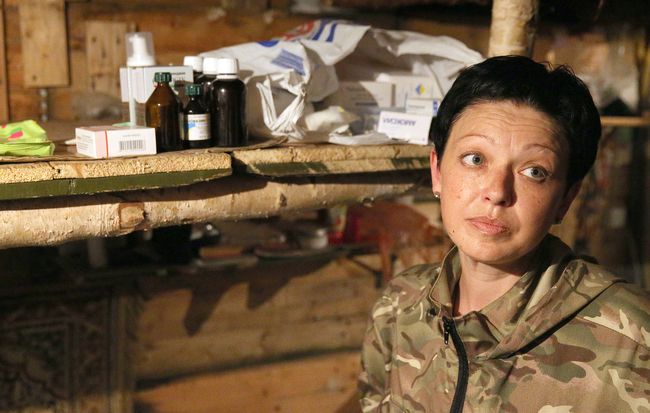
The presence of troops in a particular area provides not only a means of defense, but also a means of influence. According to Yurii Fomenko from Dnipro, “Efficiency of an area command can be determined by the local population’s opinion of the troops.” Provocative attacks, shellings, bloodshed, and casualties among soldiers and civilians alike form the background for extremely nervous reactions of ordinary citizens. Still, either the local population becomes an asset that will help you, or you will always feel the chill behind your back. While the soldier is in any case armed when facing people, the doctor is obviously there to help them.
The periphery suffers from a lack of quality health care. When the war started in eastern Ukraine, doctors almost disappeared altogether from the areas adjacent to the war zone. “You can skip meals,” says a resident of Popasna, “but you just cannot stay untreated when experiencing severe pain.” Since the beginning of the war, doctors of the Pirogov First Volunteer Mobile Hospital (FVMH) have taken it on themselves to fill the void of frontline health care. Eventually, and totally predictably, their mission went beyond evacuating the wounded, providing first aid and conducting surgeries. The doctors’ job in the Donbas is ideological as well. They work with minds and souls. The locals’ minds are largely clouded by Russian propaganda, while their souls are pierced by the pain of losses and human tragedy brought by the war.

We are at the Popasna District Hospital. An urologist from Luhansk who had asked for anonymity because even his family did not know that he worked near the war zone, diagnosed those who invited the Russian invaders to his city thus: “Sorry, but they suffer from a condition like that of a woman of easy virtue who provided her services but did not get paid. She then blames everyone except herself.”
This is an unsparing allegory, but it is completely understandable to that native of Luhansk who witnessed the occupation, collaboration and, ultimately, the loss of his home. He uttered these words in a hallway near his office, and elderly residents of Popasna who heard them nodded approvingly. Even before the fighting started, Popasna was a neglected proletarian town suffering from a bunch of post-Soviet diseases. Its residents are mostly elderly people with suitable Communist sympathies. The tragedy unfolded before their eyes. Many of them still remember World War Two explosions they witnessed in childhood years.
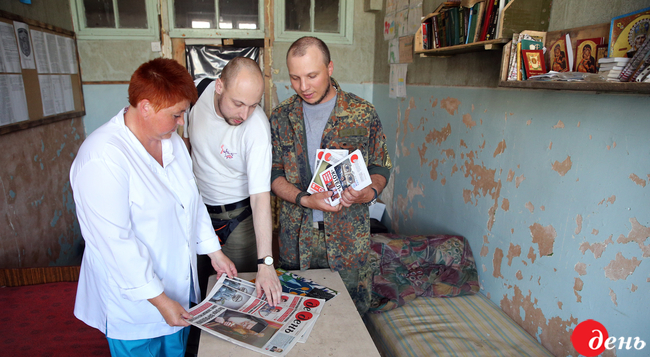
OLENA SHERSTIUK, THE FVMH’S DOCTOR FROM CHERNIHIV REGION: “THE DAY’S BOOKS ARE BADLY NEEDED BY FRONTLINE SOLDIERS”
“I never expected to hear gunshots again,” an elderly woman says. She is now at the hospital and would like to see her family come and visit her there. She is not from the town itself, but rather a resident of a village near Popasna. Predictably, she sees the Soviet era as a good time, but speaks only Ukrainian. This is not the mixed Ukrainian-Russian language of the Kyiv Metro, but rather the Ukrainian language as spoken in villages of eastern Ukraine.
To understand these people, one needs to look at an elderly woman who carries a wooden log near Sloviansk against the background of destroyed buildings. Luhansk photographer Yurii Khromushyn once took picture of another old woman from the Donbas who was carrying a similar log on her shoulder. That picture was taken before the war, though. What has changed since then? These people were abandoned then and are now. They have only the doctor as both healer and confessor. Meanwhile, the log is still there, on the old woman’s shoulder...
One can stop on the roadside in these places, but moving off the road further than for a meter is risky. Liepiestki, as PFM-1 small anti-personnel landmines are known locally, have inflicted a lot of casualties precisely on the civilian population. They fly up like a butterfly, and then detonate. An old woman who ran for a cow; a driver who went to relieve himself to the bush; a child who was too immersed in a flower play... At best, they get to the hospital with grave injuries, but most ordinary people get killed after taking one incautious step. This provides another kind of the background to the Popasna residents’ sorry lives.
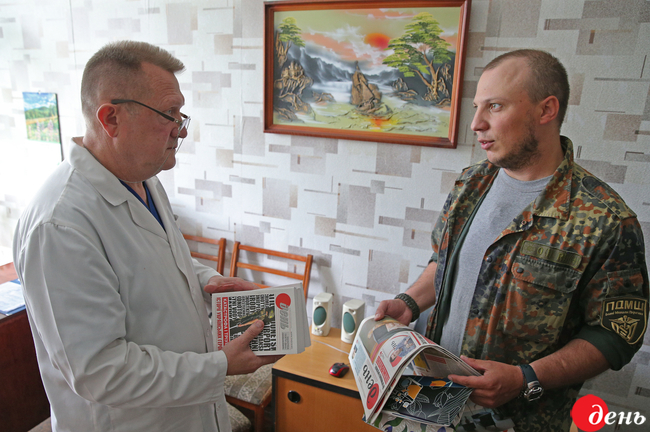
OLEKSANDR KOVALCHUK, CHIEF DOCTOR OF THE POPASNA HOSPITAL, AND IHOR BUIVOL, FVMH’S DOCTOR: “THE FVMH’S DOCTORS ARE VERY HELPFUL”
As morning came, we journalists woke up in the basement of the Popasna District Hospital, where the FVMH’s doctors sleep, but found none of the staff still there. Some had gone off on house calls, others were already in the operating theater. They had a wounded soldier brought in. He had a mine trauma inflicted by an exploded grenade. His friend was killed by the same. This is what gets listed as “non-combat losses,” suffered without direct combat contact. The army is waiting – in the woods, in damp dugouts, in dilapidated buildings of abandoned mines. They do not know what to wait for, since they get neither attack orders nor retreat orders. Their only job is to hold positions. They get repeatedly shelled, and men die from enemy mortar fire or from boredom-induced carelessness.
“The separatists have encircled Stanytsia-Luhanska,” we heard from a soldier of the Armed Forces of Ukraine, “but one would not know it from markings on the official map of the line of contact. They are very close to Novoaidar and slowly occupy new positions. And perhaps it would be better if they go on the open offensive. The blind OSCE sees nothing, while we need a pretext to go on the attack, because things cannot continue this way.”
For a long time already, both soldiers and doctors use the word “separatists” not to describe the so-called militiamen. No, the term has stuck to the Russian army as well as the local collaborators who have been hired by them.
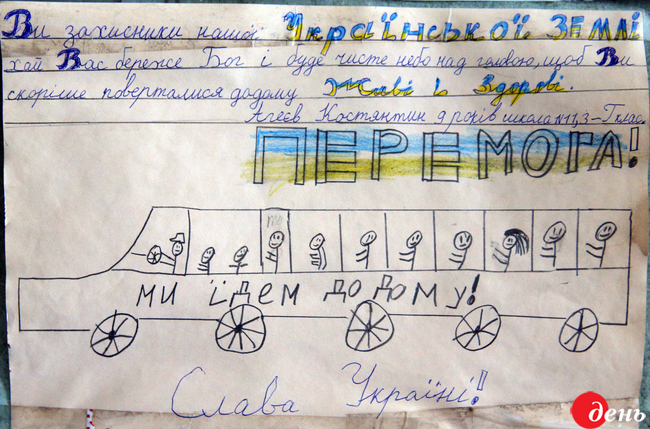
CHILDREN’S DRAWINGS IS THE BEST MOTIVATION
“Reasonable people know that it was Russians who brought turmoil to my city of Kramatorsk,” we heard from general and emergency surgeon Yaroslav Boiarko, who is now in Popasna with the FVMH. “Cops and Security Service officers observed it all, but they either were in cahoots with the enemy or displayed passivity, waiting how it would pan out. It ended tragically for thousands of people. I have learned much from the war, including as a professional, because the mechanism of combat injuries differs from that of peacetime ones. For example, while we treat and stitch up a knife wound on the leg, no stitches should be done immediately on a gunshot wound. Military doctors were not prepared for such details early in the war. Subsequently, people started to gain experience.”
“Our army was collapsing, and military medicine was collapsing as well,” Dnipro-based anesthetist Anastasia Nikolaieva told us. “Now, if you compare military medicine of Ukraine and Israel, they still teach us, but Ukrainian military doctors now have much to teach, say, their Polish colleagues. War is a tragedy, but it is also a learning time. Russia’s aggression has prompted us to enter another development stage. We have to use this. We are actually fighting for Europe. I went to the FVMH because I know that people were born and will be born in peacetime, while in wartime, one should be where there is a shortage of care. The government gives its doctors the war veteran rights, while volunteer doctors are left alone. The government’s apathy will do no good.”
“After the war started, this district hospital was left with one person serving as the chief doctor, head of the department, and its only surgeon,” Kyiv-based trauma doctor Serhii Fedorenko explained. “Of course, the FVMH came to the rescue, but the problem is still urgent. The hospital only got an urologist from Luhansk, while others just disappeared. From my experience, the government hinders our work rather than helps us. I believe that the Health Ministry should be closed down altogether and make way for a new, more efficient agency, which would rely on experience of volunteer organizations as well. After two years, people experience significant fatigue, but the government ought to exploit the initial enthusiasm and make these spontaneously-created schemes part of the health industry’s regular patterns. Instead, volunteer organizations have become a bone in the throat for bureaucrats. The Ministry of Health believes even that we, volunteer doctors, are not needed on the front line at all. But those doctors and officials with whom we work here are of a quite different opinion. The farther officials are from the frontlines and urgent needs and realities of the situation, the more they inhabit a different reality.”
We heard shellings on the day when we talked with doctors at the Popasna hospital, which is located a few kilometers from the pro-Russian militants’ positions. The FVMH’s doctors know that this tour of duty may be their last, because the volunteer movement is now subsiding, and the government rewards them with secondment certificates at best. Who will remain at the medical frontlines which run through Luhansk region close to the line of contact? This is an urgent problem that needs to be addressed immediately. So far, we have only seen progress on state support in terms of awards. President Petro Poroshenko has awarded orders and medals to 47 health workers, 12 of whom are doctors and paramedics of the FVMH. Another doctor of that hospital was awarded the honorary title “Honored Doctor of Ukraine.” The latter fact is giving hope that the government of Ukraine will perhaps finally pay attention to this unique war-induced phenomenon – the doctors’ volunteer movement.
A STORY OF ONE PHOTO
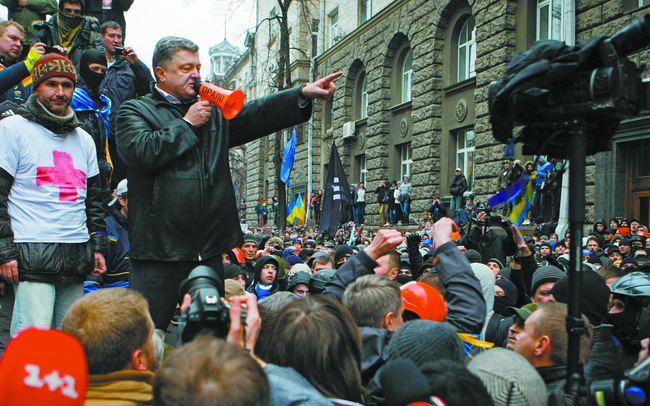
ON DECEMBER 1, 2013, CLASHES INVOLVING UNKNOWN MASKED ASSAILANTS HAPPENED IN KYIV’S BANKOVA STREET. HENNADII DRUZENKO, WHO ACCIDENTALLY GOT INTO THE PHOTO, WAS NOT ACCIDENTALLY AT ALL ON THE MAIDAN. HE ORGANIZED THE PIROGOV FVMH, INITIALLY AIMING TO PROVIDE AID TO EUROMAIDAN PROTESTERS. IT THEN STARTED TO HELP SOLDIERS AT THE FRONT AS WELL / Photo by Mykola TYMCHENKO, The Day
Hennadii DRUZENKO, founder and chairman of the FVMH, posted on his Facebook page:
Soldiers save our homeland from the aggression of the enemy by protecting me and you. Doctors save lives of our soldiers and take care of their health. They do it voluntarily, often forgoing their own vacations, putting all their knowledge and heart in it. Therefore, these doctors are heroes.






